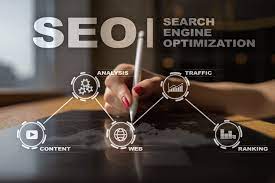In today’s digital age, having a strong online presence is crucial for businesses of all sizes. One of the most effective ways to achieve this is through Search Engine Optimization (SEO). SEO plays a vital role in driving organic traffic to your website and increasing its visibility on search engine result pages (SERPs).
So, what exactly is digital SEO? In simple terms, it refers to the process of optimizing your website and its content to rank higher on search engines like Google, Bing, and Yahoo. By utilizing various techniques and strategies, you can improve your website’s chances of appearing at the top of relevant search results.
The benefits of implementing digital SEO are numerous. First and foremost, it helps increase your website’s visibility. When your site ranks higher on SERPs, more people are likely to find it when searching for relevant keywords or phrases. This increased visibility translates into more organic traffic, which can ultimately lead to higher conversions and sales.
Digital SEO also helps in building credibility and trust with your audience. When users see your website consistently appearing at the top of search results, it creates a perception that you are an authority in your industry. This can greatly impact their decision-making process and make them more inclined to choose your products or services over competitors.
Moreover, implementing effective SEO strategies can lead to a better user experience on your website. Optimization techniques such as improving site speed, enhancing mobile responsiveness, and organizing content in a user-friendly manner contribute to a positive browsing experience. Users are more likely to stay longer on a well-optimized site, reducing bounce rates and increasing engagement.
When it comes to digital SEO techniques, there are several key factors that play a significant role in determining search engine rankings. These include keyword research and optimization, on-page optimization (such as meta tags, headings, and content structure), off-page optimization (such as link building), technical SEO (including site speed optimization and XML sitemaps), and user experience optimization.
However, it’s important to note that SEO is an ongoing process. Search engines constantly update their algorithms to provide the best possible results for users. This means that staying up-to-date with the latest trends and best practices is crucial for maintaining and improving your website’s rankings.
While digital SEO can be complex and time-consuming, the benefits it brings to your business are undeniable. Investing in a well-executed SEO strategy can help you reach a wider audience, increase brand visibility, and ultimately drive more traffic and conversions.
If you’re unsure about where to start or lack the expertise in-house, consider partnering with a reputable digital marketing agency that specializes in SEO. They can provide valuable insights, develop a customized strategy tailored to your business goals, and help you navigate the ever-evolving landscape of digital SEO.
In conclusion, digital SEO is an essential component of any successful online marketing strategy. By optimizing your website for search engines, you can improve visibility, credibility, user experience, and ultimately drive more organic traffic to your site. Embrace the power of digital SEO and unlock the full potential of your online presence.
Commonly Asked Questions About Digital SEO
- What are the 4 types of SEO?
- Is SEO considered digital marketing?
- What is an example of SEO?
- How much does it cost to do SEO?
- How is SEO done in digital marketing?
- What is SEO in digital?
What are the 4 types of SEO?
The four types of SEO, or Search Engine Optimization, can be categorized as follows:
- On-Page SEO: This type of SEO focuses on optimizing individual web pages to improve their visibility and rank higher on search engine result pages (SERPs). On-page SEO techniques include optimizing meta tags, headings, URLs, keyword usage, content quality and structure, internal linking, and image optimization.
- Off-Page SEO: Off-page SEO refers to activities that are done outside of your website to improve its visibility and authority. It involves building high-quality backlinks from other reputable websites, social media engagement, online reputation management, guest blogging, influencer marketing, and brand mentions across the web.
- Technical SEO: Technical SEO involves optimizing the technical aspects of your website to ensure search engines can crawl and index it effectively. It includes improving site speed and performance, mobile responsiveness, URL structure optimization, XML sitemaps creation and submission, canonical tags implementation, robots.txt file optimization, and fixing crawl errors.
- Local SEO: Local SEO is focused on optimizing your website to target local searches and attract customers within a specific geographic area. It involves creating and optimizing Google My Business listings, managing online reviews and ratings, ensuring consistent NAP (name-address-phone number) information across directories, local keyword targeting in content optimization, and leveraging location-specific schema markup.
These four types of SEO work together to improve your website’s visibility in search engine rankings. A comprehensive approach that incorporates elements from each type is essential for a well-rounded SEO strategy that drives organic traffic and improves online presence.
Is SEO considered digital marketing?
Yes, SEO (Search Engine Optimization) is considered a crucial aspect of digital marketing. Digital marketing encompasses a wide range of strategies and techniques aimed at promoting products, services, or brands through digital channels such as websites, search engines, social media platforms, email marketing, and more.
SEO specifically focuses on optimizing websites and their content to improve their visibility and rankings in search engine results. By implementing various SEO techniques, businesses aim to increase organic (non-paid) traffic to their websites and attract relevant audiences who are actively searching for products or services related to their industry.
In the broader context of digital marketing, SEO plays a significant role in driving targeted traffic to websites. It complements other digital marketing strategies such as content marketing, social media marketing, paid advertising campaigns, email marketing, and more. These strategies work together to create a comprehensive online presence that attracts and engages potential customers.
Digital marketers often integrate SEO into their overall marketing strategy because it offers long-term benefits by improving organic search visibility. By optimizing websites for search engines and aligning content with user intent and popular keywords/phrases, businesses can increase their chances of being found by potential customers organically.
Additionally, SEO helps enhance the user experience on websites by improving site speed, mobile responsiveness, navigation structure, and other technical aspects. This positive user experience contributes to higher engagement rates and better conversion rates.
In summary, while SEO is just one component of digital marketing, it is an essential practice that can significantly impact a business’s online visibility and success. Incorporating effective SEO techniques into your digital marketing strategy can help drive targeted traffic to your website and ultimately lead to increased brand awareness, customer engagement, and conversions.
What is an example of SEO?
One example of SEO is optimizing a website’s content with relevant keywords. Let’s say you have a website that sells handmade jewelry. To improve your search engine rankings and attract more organic traffic, you would conduct keyword research to identify the terms and phrases that potential customers are using when searching for jewelry online.
Based on your research, you might discover that “handmade silver necklaces” and “unique gemstone bracelets” are popular keywords in your industry. You would then strategically incorporate these keywords into your website’s content, including product descriptions, blog posts, and meta tags.
By doing so, search engines like Google will recognize the relevance of your website to those specific keywords and rank it higher in search results when users search for those terms. This increases the likelihood of your website being seen by potential customers who are actively looking for the products you offer.
However, it’s important to note that effective SEO involves more than just keyword optimization. It also includes other factors such as creating high-quality content, optimizing page load speed, improving user experience, building backlinks from reputable websites, and ensuring mobile responsiveness. These elements work together to enhance your website’s overall visibility and ranking on search engine result pages.
How much does it cost to do SEO?
The cost of SEO can vary significantly depending on various factors, including the size and complexity of your website, your industry, competition, geographic location, and the specific goals you want to achieve. There is no one-size-fits-all answer when it comes to pricing for SEO services.
Some companies offer SEO packages with fixed prices, while others provide customized solutions based on your unique needs. Generally, SEO services can range from a few hundred dollars per month to several thousand dollars per month for more extensive and competitive campaigns.
It’s important to approach SEO as an investment rather than an expense. A well-executed SEO strategy can yield significant long-term benefits for your business by driving organic traffic, increasing conversions, and improving brand visibility. When considering the cost of SEO services, it’s essential to evaluate the potential return on investment (ROI) that it can generate.
When choosing an SEO provider or agency, it’s crucial to consider their expertise, track record, and the value they offer. Be cautious of extremely low-cost providers that promise quick results or use unethical practices (known as black hat techniques), as these can harm your website’s reputation in the long run.
It’s recommended to consult with multiple reputable agencies or professionals to get a clear understanding of their pricing structures and the specific services included in their packages. They should be able to provide you with a detailed proposal outlining their strategies and deliverables.
Remember that effective SEO is an ongoing process that requires continuous monitoring, optimization, and adaptation based on search engine algorithm updates and changes in your industry. Therefore, it’s important to consider long-term partnerships or monthly retainer agreements rather than one-time fixes.
Ultimately, the cost of SEO should align with your budget and business goals. It’s worth investing in quality SEO services from experienced professionals who can help you achieve sustainable growth and maximize your online presence.
How is SEO done in digital marketing?
SEO, or Search Engine Optimization, is a fundamental aspect of digital marketing. It involves optimizing your website and its content to improve its visibility and ranking on search engine result pages (SERPs). Here are some key steps involved in implementing SEO as part of your digital marketing strategy:
- Keyword Research: Start by conducting thorough keyword research to identify the most relevant and valuable keywords related to your business, products, or services. These keywords should have a good search volume and low competition.
- On-Page Optimization: Optimize your website’s on-page elements to align with the targeted keywords. This includes optimizing meta tags (title tags, meta descriptions), headings, URLs, and optimizing the content itself with relevant keywords. Ensure that your content is well-structured, informative, and engaging for users.
- Technical SEO: Pay attention to technical aspects that affect your website’s performance and user experience. This includes optimizing site speed, improving mobile responsiveness, using SSL certificates for secure browsing, creating XML sitemaps for easier indexing by search engines, and ensuring proper URL structure.
- Off-Page Optimization: Build high-quality backlinks from reputable websites to enhance your website’s authority and credibility in the eyes of search engines. Engage in link building activities such as guest blogging, influencer outreach, social media promotion, and participating in relevant industry forums or communities.
- Content Creation: Develop high-quality content that provides value to your target audience. Focus on creating informative blog posts, articles, videos, infographics, or other types of content that address their needs and interests. Incorporate targeted keywords naturally into your content while maintaining readability.
- User Experience Optimization: Enhance user experience on your website by ensuring easy navigation, intuitive design, clear calls-to-action (CTAs), and fast-loading pages. Make sure your website is mobile-friendly since mobile usage continues to rise.
- Monitoring and Analytics: Regularly monitor your website’s performance using tools like Google Analytics and Search Console. Analyze key metrics such as organic traffic, bounce rates, click-through rates (CTRs), and keyword rankings. This data will help you identify areas for improvement and make data-driven decisions.
- Continuous Optimization: SEO is an ongoing process that requires constant monitoring and optimization. Stay updated with the latest SEO trends, algorithm changes, and best practices to keep your website competitive. Regularly update your content, adapt to new search engine guidelines, and refine your strategies based on performance analysis.
Remember that SEO is a long-term investment. It takes time to see significant results, so patience and consistency are key. It’s also worth considering seeking assistance from experienced SEO professionals or digital marketing agencies who can provide expertise and guidance throughout the process.
What is SEO in digital?
SEO, or Search Engine Optimization, is a fundamental aspect of digital marketing. It refers to the practice of optimizing a website and its content to improve its visibility and ranking on search engine result pages (SERPs). In other words, SEO aims to increase organic (non-paid) traffic to a website by making it more relevant and appealing to search engines like Google, Bing, and Yahoo.
In the digital context, SEO involves various techniques and strategies that help search engines understand the content of a website and determine its relevance to specific search queries. This includes optimizing on-page elements such as meta tags, headings, keywords, and content structure. It also involves off-page optimization tactics such as link building and social media promotion.
The goal of SEO in the digital realm is to ensure that a website appears prominently in search results when users search for relevant keywords or phrases related to the website’s content or offerings. By ranking higher on SERPs, websites have a better chance of attracting organic traffic from users who are actively searching for information, products, or services related to their industry or niche.
The importance of SEO in the digital landscape cannot be overstated. With millions of websites competing for attention online, having a well-optimized website can give businesses a competitive edge. It helps them stand out from the crowd and attract targeted traffic that is more likely to convert into customers or clients.
Furthermore, SEO is an ongoing process that requires continuous monitoring, analysis, and adaptation. Search engines frequently update their algorithms to provide users with the most relevant and high-quality results. This means that SEO strategies need to be regularly adjusted to align with these algorithm changes and evolving best practices.
Ultimately, SEO in the digital realm serves as a foundation for effective online marketing strategies. By investing time and resources into optimizing your website for search engines, you can enhance your online visibility, increase organic traffic, build brand authority, improve user experience, and ultimately drive business growth in the digital landscape.




